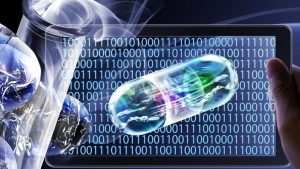Impact of AI During and After the COVID-19 Pandemic
- January 15, 2021
- Posted by: admin
- Category: Artificial Intelligence
Introduction
The COVID-19 pandemic has affected all our lives while also straining our healthcare systems around the world. Healthcare facilities and hospitals have been overwhelmed with the sheer volume of patients needing help. Organizations and enterprises have had to bear the brunt too. Thousands have lost jobs, while several companies are trying to use the hardships of the past year to get rid of redundant talent by hiring new talent while utilizing new technology-driven strategies.
Artificial Intelligence (AI) is projected to be the possible solution to such problems. It is also a tool that can help reveal the capabilities of adjacent technologies and while reshaping how the organization functions.
Impact of AI During and After the COVID-19 Pandemic
1. AI in the Healthcare Industry

From supporting the screening of patients, to monitoring COVID-19 pandemic signs and symptoms, to offering decision support for CT scans and automating hospital operational functions, AI is being used in the fight against the COVID-19 pandemic.
| Fact: In China’s Wuhan Wuchang Hospital, AI was used to create a smart field hospital, staffed mostly by robots that served food and medication to patients. The hospital also monitored patients’ vital signs using bracelet-like devices. |
2. AI Advancements in Agriculture and Aviation
AI is already being used to solve some of the world’s greatest social and economic challenges, and many more mundane functions. In agriculture, AI advancements show developments in the growth of crops. NASA’s Aircraft Operations Division (AOD) is using AI as proxy operators for training and combat simulators.
3. AI in Insurance and Banking
AI is having a huge impact on the insurance and banking sectors. For example, the technology created for facial recognition in photographs is being customized for insurance-specific applications. Image analysis algorithms can now consistently recognize car models, identify and quantify previous damage, recognize vehicle parts, analyze documents, read license plates, and more – all from videos and photos.
With the help of AI, banks are frequently presenting innovative offers and introducing new products to target particular customers. AI has also aided in a more precise and better-informed assessment of possible customers with the extra benefits of lower costs and quicker turnaround times.
| Note: With AI’s capability to learn over a period of time, an AI-built system can also record when an honest transaction is tagged as fraud and permitted by the consumer and make the correction for future references. |
4. AI in the Oil and Gas Industry
The oil and gas industry has always utilized the latest technological innovations and big data (seismic imaging) before it was even termed as “big data”. However, advances in analytics, including AI and Machine Learning (ML), are offering new ways to interpret this data while yielding previously incomprehensible insights.
5. Digital Transformation
Digital transformation has focused only on the digitization of products and services so far, however, it has been predicted that in 2021, there will be more focus on leveraging AI for optimization and automated business decision-making.
Conclusion
Huge improvements have been made in the field of AI research – from diverse algorithms for discovering complex patterns in data, to game-playing programs that perform better than human champs, to self-driving cars. With developments in computing storage and capacity and profitable consumption models such as the cloud, real-world applications of AI have travelled from academic domains into the mainstream. With information now available at desirable scales, depth, and charges, AI applications are set to change our world.
